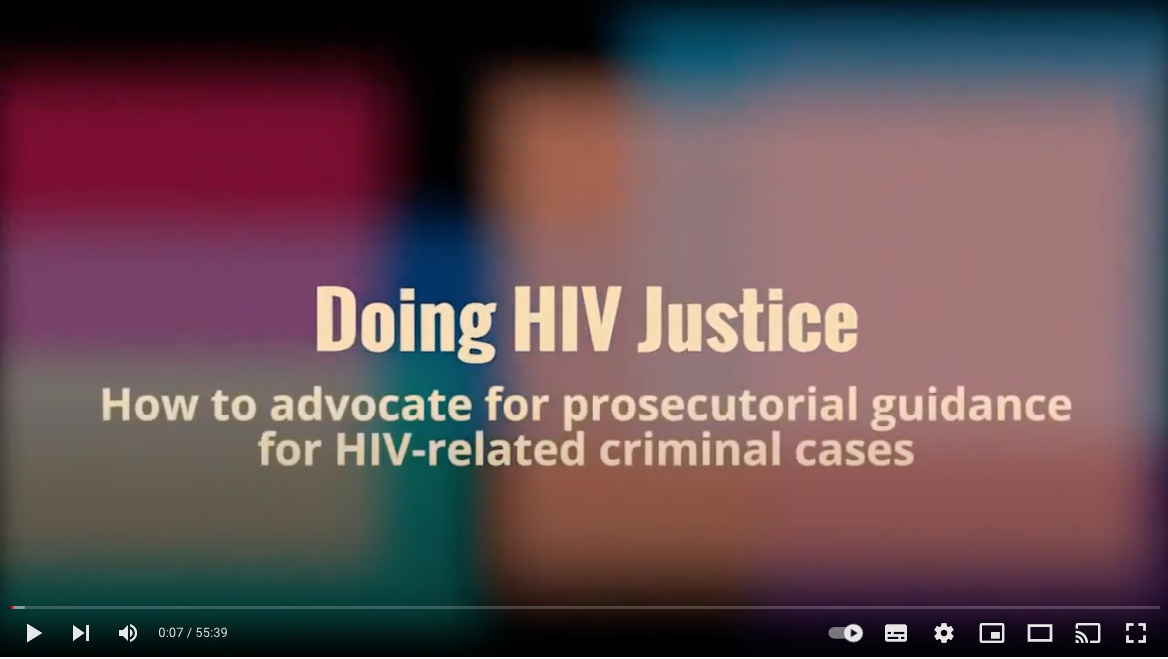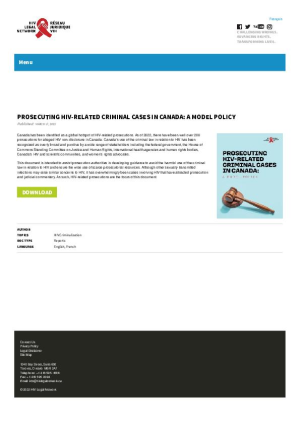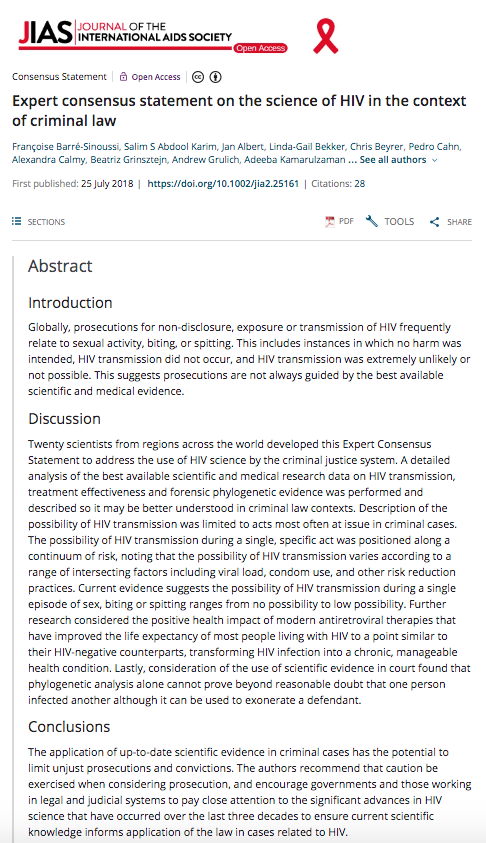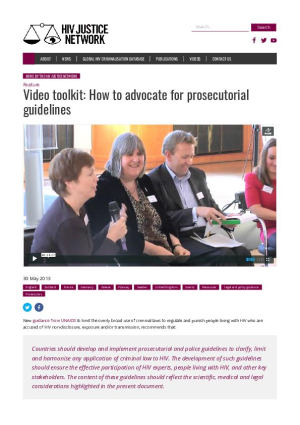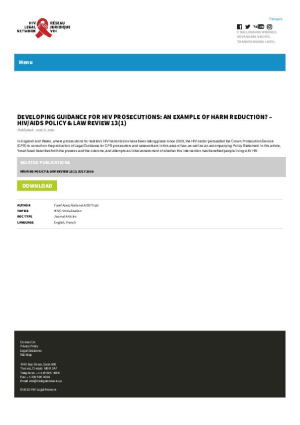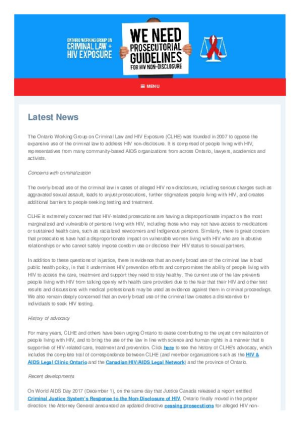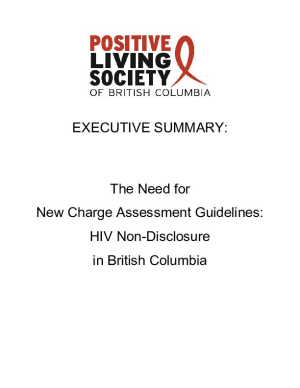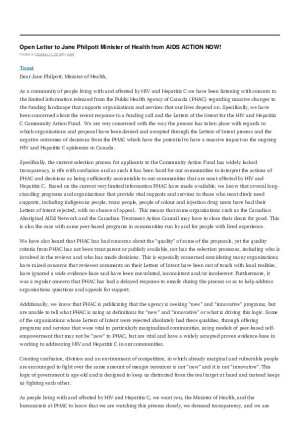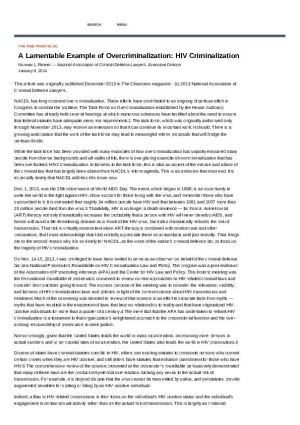In this episode of HIV Justice Live! HIV Justice Networks looks at UNDP’s new Guidance for Prosecutors; we learn from activists from England & Wales how they worked with the Crown Prosecution Service to establish prosecutorial guidelines; and we hear about similar attempts in Canada.
Educating prosecutors
Advocating for prosecutorial guidelines
Two U.K. jurisdictions (England and Wales, and Scotland) and Canada are the only countries in the world to have produced prosecutorial guidelines. Advocates in numerous other countries continue to advocate for prosecutorial guidelines to limit prosecutions of people living with HIV for exposure or transmission.
Prosecuting HIV-Related Criminal Cases in Canada: A Model Policy
This document is intended to assist prosecution authorities in developing guidance to avoid the harmful use of the criminal law in relation to HIV and ensure the wise use of scarce prosecutorial resources. Although other sexually transmitted infections may raise similar concerns to HIV, it has overwhelmingly been cases involving HIV that have attracted prosecution and judicial commentary. As such, HIV-related prosecutions are the focus of this document.
Expert consensus statement on the science of HIV in the context of criminal law
Twenty scientists from regions across the world developed this Expert Consensus Statement to address the use of HIV science by the criminal justice system. Description of the possibility of HIV transmission was limited to acts most often at issue in criminal cases. The authors recommend that caution be exercised when considering prosecution, and encourage governments and those working in legal and judicial systems to pay close attention to the significant advances in HIV science that have occurred over the last three decades to ensure current scientific knowledge informs application of the law in cases related to HIV.
- Alternative links
- Czech: Expertní prohlášení k vědeckým poznatkům o HIV v kontextu trestního práva , French: Déclaration de consensus d'experts sur la connaissance scientifique relative au VIH dans le contexte du droit pénal, German: Expertenkonsens zur HIV-Wissenschaft im Kontext des Strafrechts, Mandarin: 專家共識聲明:刑法脈絡下的愛滋相關科學, Russian: Заявление об экспертном консенсусе в отношении научных данных о ВИЧ- инфекции в контексте уголовного права , Spanish: Declaración de Consenso de expertos sobre la ciencia relativa al VIH en el contexto del derecho penal
How to advocate for prosecutorial guidelines
This video toolkit comprises a workshop held during a seminar on HIV criminalisation in Berlin in September 2012 to discuss challenges associated with the creation of prosecution guidelines, providing important insights from prosecutors and civil society alike. The workshop followed the European premiere of the documentary ‘Doing HIV Justice: Clarifying criminal law and policy through prosecutorial guidance’ which explores how prosecution guidelines were created for England and Wales
Doing HIV Justice: Clarifying criminal law and policy through prosecutorial guidance
Demystifies how civil society worked with the Crown Prosecution Service of England & Wales to create the world’s first policy and guidance for prosecuting the reckless or intentional transmission of sexual infection.
Developing guidance for HIV prosecutions: an example of harm reduction?
Describes both the process and the outcome of community lobbying the Crown Prosecution Service to develop guidance for prosecutors on HIV cases, and whether this intervention has benefited people living with HIV.
Ontario Working Group on Criminal Law and HIV Exposure
Information on advocating for prosecutorial guidelines.
Position Paper: The Need for New Charge Assessment Guidelines: HIV Non-Disclosure in British Columbia
Outlines different ways to address HIV non-disclosure: charge assessment guidelines, a public health approach, and prosecutorial guidelines. Provides recommendations.
Taking the fight against HIV criminalization to Crown Prosecutors
Outlines a stage in AIDS Action Now’s Think Twice campaign, which involved sending letters to the Ontario Crown Prosecutors who have brought forward HIV non-disclosure prosecutions, as well as their bosses and the Attorney General, asking them to ‘think twice’ before pursuing prosecutions.
Consultation on Prosecutorial Guidelines for Ontario Cases Involving Non-disclosure of Sexually Transmitted Infections: Community Report and Recommendations to the Attorney General of Ontario
Aims to contribute to Ontario Ministry of the Attorney General (MAG)’s consideration of guidance to assist Crown counsel to make fair and timely decisions in cases based on allegations of nondisclosure of HIV or other sexually transmitted infections to a sexual partner. Reflects discussions, feedback and recommendations from community consultations. Recommends specific text with accompanying rationale.
Criminal prosecutions for non-disclosure of HIV: engaging with governmental health authorities to advocate for the development of prosecutorial guidelines in Quebec
Describes creation of a working group facilitating dialogue between the justice and public health authorities on the issue of criminalization. The working group called on the Justice Ministry to develop prosecutorial policies and guidelines. Governmental health authorities proved to be key allies in opening a dialogue with the Justice Ministry. Suggests that health authorities should play a central role in the development of prosecutorial policies and guidelines.
Inside NACDL: A Lamentable Example of Overcriminalization: HIV Criminalization
Norman L. Reimer, Executive Director of the National Association of Criminal Defense Lawyers, writes about the first U.S. National Prosecutors Roundtable on HIV Criminalization Law and Policy – jointly convened by the Association of Prosecuting Attorneys (APA) and the Center for HIV Law and Policy - noting that the APA will endeavour to develop consensus positions with respect to reform of HIV-related laws.

